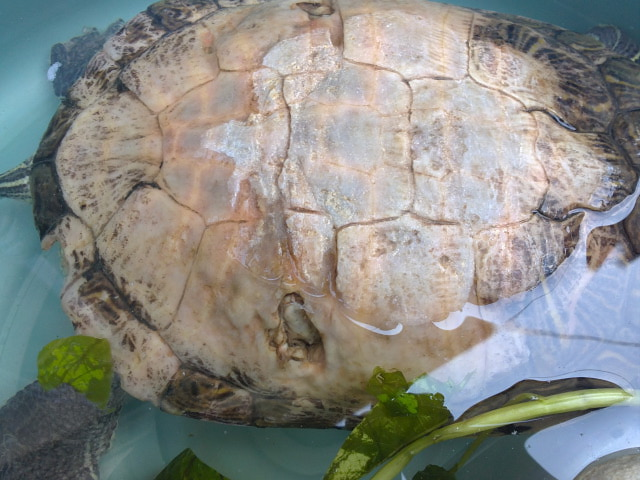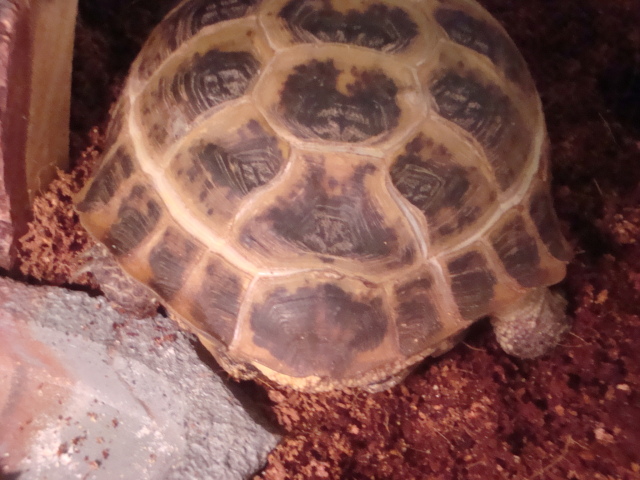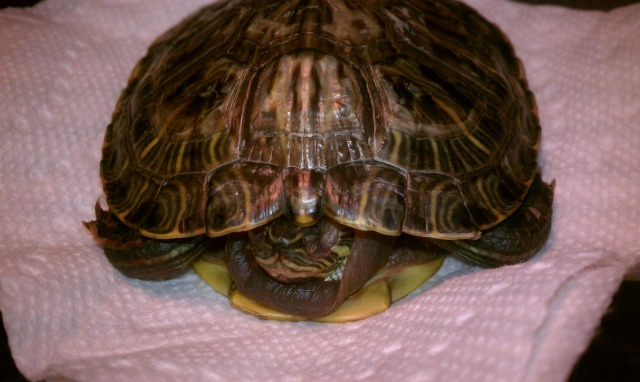QuestionHi Mark,
Maybe you can answer my question or, at least, stear me in the right direction. My daughter has a pet turtle, a red eared slider. She's had it for about a month now. We have all the proper setup here at home, but she took it to school this past Monday for her zoology class. She brought it back home Friday, and we noticed this morning (Saturday) that her eyes are swollen shut and she's not near as active as usual. I'm assuming she may have an infection, but certainly not sure about that. I've been using some Saline drops for eyes on the advice of our local vet who admits knowing nothing about turtles. I'm assuming the different habitat at school with the setup there may be the problem. Do you have any suggestions as to anything else we could possibly do?
We'd greatly appreciate anything you can tell us or a referral, if necessary.
Looking forward to hearing from you.
Thank you,
Anita H.
AnswerAs I state in my profile, I am not a vet, but...
Eye infections are common problems in turtles, and your vet's advice is good advice if the key issue is a physical irritation, like sand or something.
However, a quick Googling of the Internet with the key words 'turtle swollen eye' reveals many sites dicussing this problem. Like a lot of on-line advice, some if it is good, some worthless.
I agree that the change is the cause, but that does not help us figure out the next step. It might have picked up a general bug (like a cold), a specifiic bug (like that which often causes eye, nose, and mouth problems in turtles), a bit of grit in the eye, or just come down with something becuase of the difference in water/food/temp/etc. It mght even be a manifestation of simple stress.
What I would do is:
1. Clean the tank carefully with a mild bleach and water mix. Rinse and rebuild.
2. Boost temps a bit. Make the cage nice and comfy. Be sure to keep a cooler 'retreat' location.
3. Review basic care and feeding. Do some research to make sure your care is appropriate, check temps with thermometers, etc.
4. Pick up some good reptile vitamins (reptiles need Vitamin B13, not B12 so most other vitamins don't help as much) and give about 50% more than usual.
5. Consider using some triple antibiotic ointment on its eyes. You can get a version designed to be used in eyes at some drug stores. This is a bit expensive, and it is using sort of a 'shotgun' approach instead of making a real diagnosis/prescription. I usually don't like going with meds until I KNOW what the problem is, but use your own judgement, or ask your vet for their advice.
6. After a week if no improvement is seen, try a different vet. Often vets who work with birds are good with reptiles.

 cracked/injured turtle shell
Question
turtle with injured sh
My dog bite and
cracked/injured turtle shell
Question
turtle with injured sh
My dog bite and
 Trying to figure out what type of turtle we rescued and how to care for it.
Question
turtle 2
We found and rescued a turtle on the
Trying to figure out what type of turtle we rescued and how to care for it.
Question
turtle 2
We found and rescued a turtle on the
 Russian Tortoise Shell Concerns
QuestionWalkers Shell
QUESTION: I have a male Ru
Russian Tortoise Shell Concerns
QuestionWalkers Shell
QUESTION: I have a male Ru
 Russian turtle nesting
QuestionQUESTION: hello, we have one large female and 3
Russian turtle nesting
QuestionQUESTION: hello, we have one large female and 3
 RES turtle being treated for Septicemia
QuestionQUESTION: Hello,
I have a RES turtle being tre
RES turtle being treated for Septicemia
QuestionQUESTION: Hello,
I have a RES turtle being tre